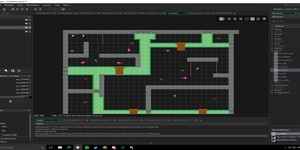

What I Learnt from Making My First Game
I've always been a fan of games. Ever since I first got my hands on my uncle's Game Boy and then eventually my own Master System, I've always been interested in what makes them tick, and I ended up making a career out of writing about the aspects I really loved.So, I made a game myself. It's just a text adventure, 20 minutes of gameplay stuffed with several illustrations and a couple of neat code tricks. Ultimately, it was a useful experience. It challenged a lot of the preconceptions I had about the business of games. Here are a few things I learnt so that, if you fancy it, maybe you can give it a go too.
Hell, if not, just laugh at my failures.
The game I created is called 20something, and it's a text adventure about dating and loneliness in London. I mention it here solely for context and so you can understand that what I created is relatively simple.

Making a game is actually pretty easy
I have very limited HTML/Javascript experience, so creating a full 3D world or using a game maker like Unity felt beyond me. It's not, but more on that in the next point.
Thankfully, for those of you like me that have a strong idea of what you want to make but not necessarily the chops to make that actually happen, you can put your ideas into sortingh.at, and it'll tell you what you can program your game in.
I ended up deciding to use Twine 1.6, used for making text adventures with narrative branches, although I flirted with both Adventure Game Studio, which lets you make adventure games like The Secret of Monkey Island and does a lot of the code heavy lifting for you, and Inform, which lets you make a text adventure that parses text, like Zork or The Hitchhikers Guide To The Galaxy.
Documentation is pretty good, and there are several communities online that can help you with pretty much anything you want to do. I've seen tutorials for inventory systems and personally implemented countdown timers, cycling links and even resource collection systems.
There's a host of powerful and free tools available for those looking to dabble in game creation and really, the only limit for many of these is how much time you've got to sit down and work out how everything pieces together.

Making a game takes a really long time
Remember when I said Unity wasn't beyond me? It's because, if you've got the time, you can learn to use pretty much any tool with enough work. I chose Twine 1.6 ultimately, because as a man with very little understanding of games, I liked how easy it was to write "passages" in the game and create something playable within a few hours of tinkering.
Thing is, perfectionism sets in, and my tiny concept for a game kept growing. The game I expected to take six weeks of after-work tinkering ended up taking closer to 18 months due to real world constraints and the occasional patch of burnout as I hit my head up against something I didn't want to do or just wanted to go to a bar and grab a drink after work instead of sitting back at my desk and grinding onwards. Making games is awesome, but, and the smart guys in the audience will have already picked it up, sometimes making a game still feels like work.

MSI MPG Velox 100R Chassis Review
October 14 2021 | 15:04









Want to comment? Please log in.